AMERICAN WEDDINGS BLOG
Stay up to date with the latest wedding ceremony trends, script writing inspiration, tips and advice for first-time officiants, and news that matters to couples and wedding ministers.
Stay up to date with the latest wedding ceremony trends, script writing inspiration, tips and advice for first-time officiants, and news that matters to couples and wedding ministers.
Published Monday, Apr. 12th, 2021
Last updated Tuesday, Feb. 4th, 2025

Modern Paganism is becoming increasingly popular in the US, and it’s hard to imagine we won’t all be invited to sit inside a sacred wedding circle at some point soon to bless a new union as the sweet musky scent of ceremonial incense wafts through the evening air.
Paganism is the fastest growing spiritual movement in the country: There were nearly 1 million to 1.4 million "Wiccan or Pagan" followers in the US in 2014, up from 340,000 in 2008, and only 8,000 openly practicing members in 1990. The number has continued to skyrocket since. (To put that in perspective, there were only an estimated 1.4 million mainline members of the Presbyterian church in 2018. )
Unfortunately, despite being increasingly mainstream, Paganism and its various rites are often misunderstood. This is partly because popular media and entertainment frequently lump all modern Pagans together into one big group (and that group is usually Wicca).
In truth, there are many smaller movements under the broad umbrella of modern Paganism, and many denominations within each movement. This means there are dozens and dozens of ‘types’ of modern Paganism.

A ceremonial circle in the woods sets a magical stage.
Well, the style of wedding you’ll attend will depend on the style of Paganism your friend or family member practices! But in general, most Pagan weddings will involve one or all of the spiritual elements listed below.
Although there will be many similarities between their wedding rites, all of these earth-based faiths are unique. They each have their own gods, their own stories, their own histories, and their own rituals, including the wedding rite.

Every part of the Pagan ceremonial wedding altar has a unique meaning.
Before you accidentally bring a Viking pig roast to a vegan Wiccan handfasting…
Take a minute to learn about the three most popular Modern Pagan movements in the US, and their special marriage customs. Scroll down for sample wedding and handfasting scripts!
Wicca is probably the most recognized modern Pagan movement in the US. It’s a staple in teen television shows and late night movies, and it’s traditional study of plant magics and remedies shares countless similarities with mainstream homeopathic medicine. Common denominations of Wicca in the US include Celtic, Gardnerian, and Eclectic Wicca, and the solo practice of Hedgewitchery.
In the US, Wicca can sometimes seem synonymous with Paganism, but this isn’t the case. It’s only one movement under the larger umbrella of earth-centered faiths called Paganism. It can also seem synonymous with Witchcraft, but again, not all witches consider themselves Wicca, although all Wiccans are witches.
In the simplest terms, Wicca is the earth-centered practice of witchcraft and worship of nature -- especially the gods, goddesses, and spirits that organize the natural world. It is heavily grounded in the protection and stewardship of the earth, and celebration of the seasons. Followers may belong to covens (close-knit groups) or practice alone.
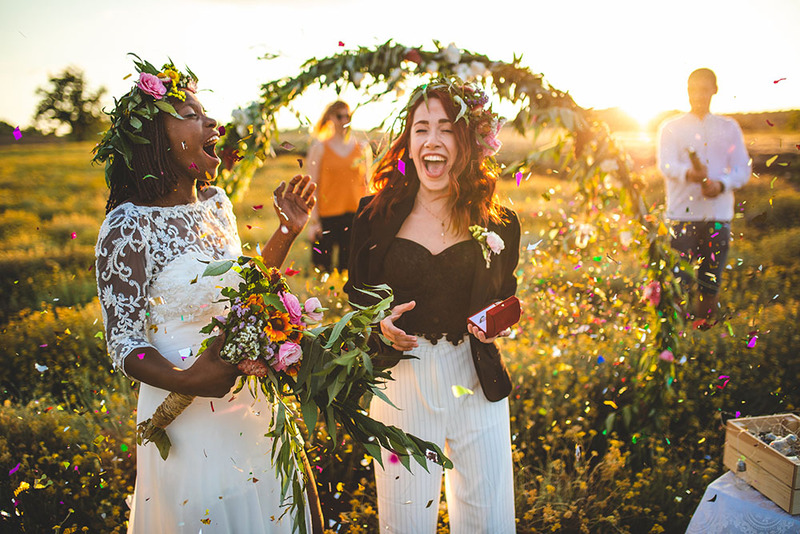
Wiccan weddings traditions include handfasting, sweeping with a besom, flowers, herbs, candles, calling the corners and casting a circle, and a ceremonial wedding altar. (Photo: Kosamtu / iStock)
For many modern Wiccans, handfasting is an essential part of the marriage rite. However, many others view handfasting as a ritual of betrothal (engagement) or as part of the Year and a Day custom, so you might see it at either type of ceremony.
During a handfasting, a priest, priestess, or honored guest will tie a decorative rope or ribbon around the two lovers' hands, wrists, or forearms, while offering a blessing and uniting the two spiritually. This ritual takes place within a sacred circle, and may involve invoking ancestors, the four corners or elements, or specific god/s or spirits.
Consider these examples of Wiccan handfasting scripts:
Wiccan Wedding Altar
The Wiccan wedding altar will include meaningful objects (such as an athame, wine, crystals, candles, incense, flowers, and herbs) and offerings to the gods. These offerings are burned over a bonfire or hearth fire during the ritual -- right before a large meal to close the celebration.
Learn more about Wiccan wedding altars and offerings:
If you’re invited to a Wiccan wedding, be prepared for celebratory fires and feasting.
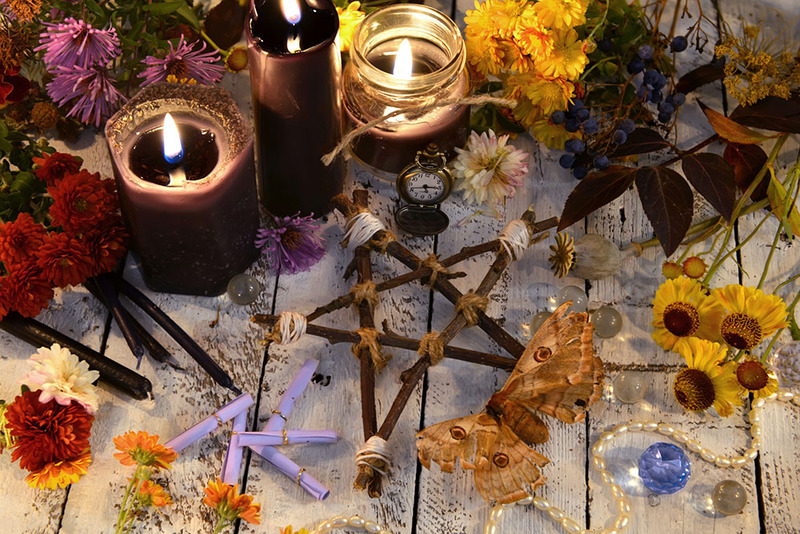
Wiccan weddings are beautiful, spiritual, and personal. Each ceremony is unique to beliefs and values of the couple getting married. (Photo: VeraPetruk / iStock)
Neo-Druidism, also called Modern Druidism or simply Druidry, is the second most popular polytheistic movement in the country. With deep ties to ancient Celtic spiritual traditions, modern Druidry is marked by a search for harmony, balance, and closeness with the natural world, and the veneration and respect for all living things, including the earth. Interestingly enough, while most modern Druids are Pagan, in the 1700s, many European Druids considered themselves Christians.
In the simplest terms, modern Druidism (or Neo-Druidism) is a spiritual practice centered in the veneration of and interaction with the gods and spirits of the natural world. They believe that all natural things, from human to tree to stream to stone, have inherent value, and share an interconnected purpose. Many Druids believe that all these things also have a soul and consciousness -- something common to animistic faiths.
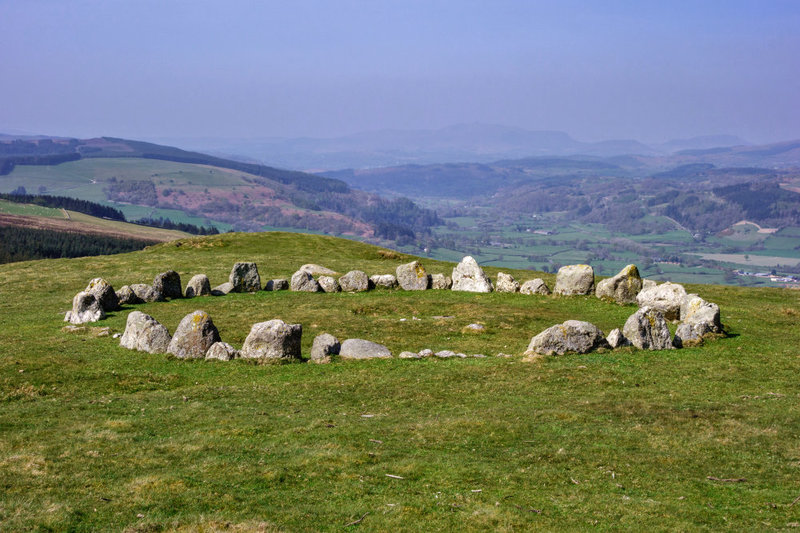
All Druid rituals take place outdoors, among the spirits of the Earth.
The Druid marriage rites almost always include a handfasting ritual. A decorative cord or ribbon is tied by a Priest or honored guest around the hands, wrists, or forearms of the couple, uniting their spirits in front of the gods and their community.
Read the article linked below to learn how to do a handfasting on your wedding day:
Druid marriage rites are usually performed outdoors in nature, within a sacred circle. The officiant will cast a circle and mark it with flowers, straw, stone, or other symbolic natural materials (known as casting a circle with the elements).
The officiant will call the quarters at the start of the wedding ceremony(also known as calling the corners), and a blessing is placed on the couple.
Guests will be plentiful -- these joyful bashes include many friends and family members, all of whom may participate with poetry, song, and storytelling.
If you’re invited to a Druid wedding, we recommend you take a nap beforehand and arrive ready to eat, drink, and celebrate for hours. These gatherings can last well into the night.
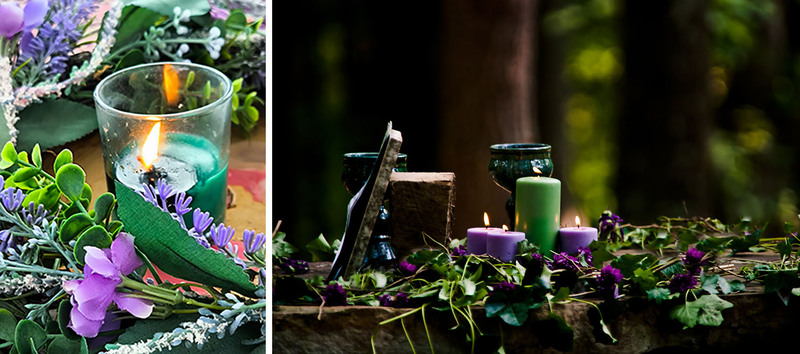
Some druid weddings include a candle lighting. Green, white, and purple candles are often used for their color magic, to welcome prosperity and abundance (green), cultivate self awareness and wisdom (purple), and to call for protection and divine blessings (white). (Photo: Left to Right, Tomás Guardia Bencomo, JEBarnhurst / iStock)
In the US, Modern Heathenism is less understood than other movements, (in part because of its contentious history, noted below) although it continues to grow steadily. One of the most popular denominations of modern Heathenism is Asatru, an earth-centered religion steeped in Viking lore and filled with the harsh and heroic mythology of Norse gods. But there are many other paths for Heathen practitioners to follow, and even non-denominational organizations, as well.
In the simplest terms, Heathenry is the worship of and relationship to pre-Christian Germanic, Norse, and Viking spirits, gods, and goddesses. They also honor their ancestors, have a deep appreciation for family, and interact with the spirits of the earth.
Note: Heathen organizations within the US, especially Asatru, have struggled and fractured as a result of widespread adoption of the religion by white supremicists and neo-nazis. Many modern organizations emphasize diversity and inclusiveness, and a majority of modern Heathens disavow any connection to racist groups, but these strong divisions continue.
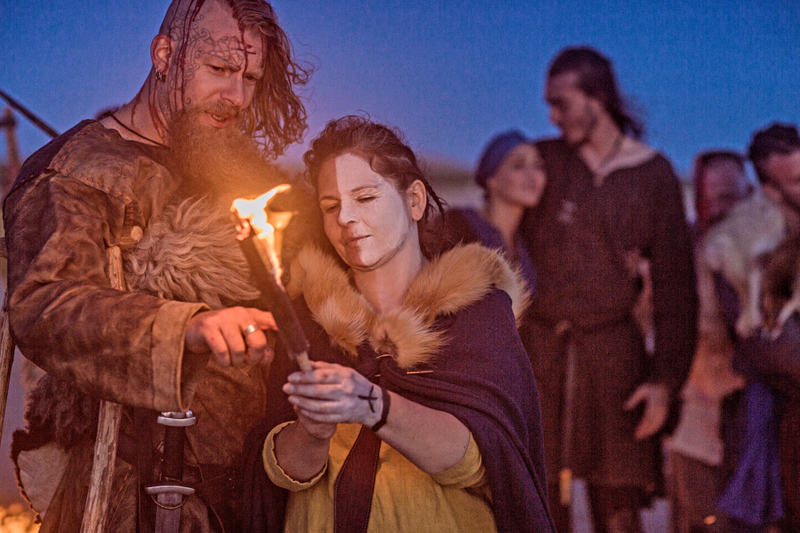
Viking weddings often include traditional clothing, drinking, songs, and ceremonial fire.
Viking weddings are raucous parties that can often last several days and nights. They're filled with feasting, storytelling, throat singing, and of course drinking! Some Viking weddings incorporate a ceremonial toast of beer, mead or blod (fermented honey wine) as part of a fun and meaningful unity ritual. The couple toasts with ceremonial drinking horns to seal their marriage vows (perfect for wedding photos!).
Consider this Viking wedding ceremony script with a unity toast:
Viking weddings also include a call to ancestors and spirits, to honor them and ask for their blessings. Offerings are made on the wedding altar, and in some cases there are even blood rituals called blots. Traditional Norse Pagan blots were blood sacrafices done with animals, but modern blots are less gruesome in practice -- usually done with small cuts on a bride or groom’s hands, or by substituting another liquid for blood (usually red wine or mead).
Consider these other Viking Wedding traditions:
Some traditional Heathen weddings include the slow roasting of a pig, followed by a feast with all of the newlywed's friends and family gathered around to laugh, drink, and share stories. A final blessing is given under a full moon during the feast, officiated by a priest or priestess (gothi or gythia).
If you’re invited to a Viking wedding, bring your heartiest thirst and appetite!
...

Head wreaths and white gowns are common at Pagan weddings, too!
We encourage you to continue to do your own research to learn more about these unique faiths. Defining Paganism is actually very difficult, and the term means something different in an ancient context than it does in a modern one. Historically, ‘pagan’ meant anyone who was ‘non-Christian’ and was used in a derogatory way, and the term has been reclaimed and redefined in many ways since those early days. Making things more complex, not all ancient Pagans were polytheists, though most modern practitioners believe in a pantheon of gods or spirits.
The three examples listed above are all reconstructed from ancient practices found in Europe, predominantly Northern Europe. They're considered “Neo-Pagan”, having only taken shape in the last century. For example, Wicca first gained popularity in England in the 1950s, and its rituals were recreated through the study of folklore, historical texts, mythology, and indigenous religions. But Paganism (and its sister polytheistic, pantheistic, and animistic faiths) can be found around the world, on every continent, and in every culture and time period.
Other popular movements in the US include Voodoo or Vodun, Dianic Wicca, Green Witchcraft, Mexicayotl.
Read Next:
Learn why online ordination is so important for modern Pagans, and how to get ordained online for free to officiate a Pagan wedding.
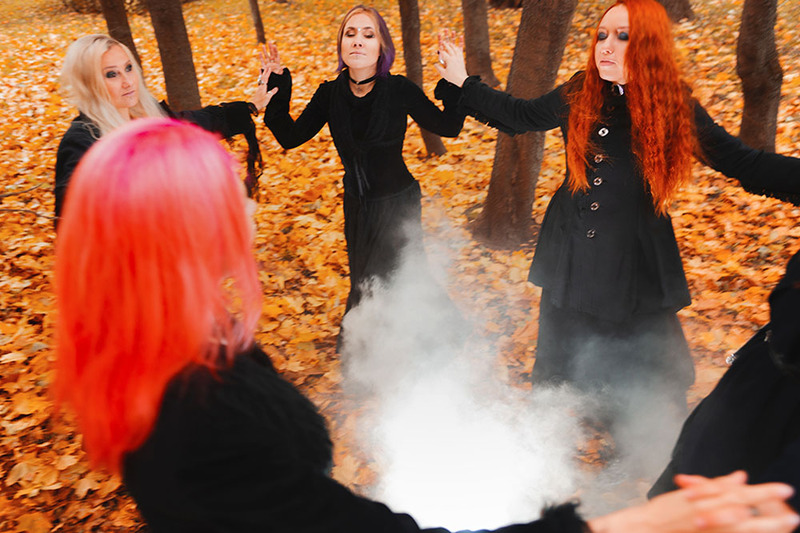
Get ordained online free with AMM and become a Pagan Wedding Officiant
Good things happen when friends and relatives help out at the wedding ceremony. Having a friend officiate your wedding or handfasting ceremony is a great way to ensure the day is as intimate and personal as it can be.
Ask a friend or family member to officiate your wedding with free online ordination through American Marriage Ministries (AMM).
|* custom-button, "https://theamm.org/ordination-application", "ORDAINED MINISTER ONLINE APPLICATION" *|
Why AMM? American Marriage Ministries is an inclusive nondenominational internet church that ordains and trains ministers to officiate marriage ceremonies. We are a recognized 501(c)(3) nonprofit church, and help people from all backgrounds and beliefs become ordained ministers for weddings. Our online ordination is free, accessible, and never expires.
Officiating weddings is an incredible honor, and a great way to show your love and support for the people getting married. As a wedding officiant, you will help to create memorable ceremonies and memories that last a lifetime.
AMM Ministers can legally officiate weddings in every state* (it's much harder in Virginia, where we're looking into our options). After getting ordained with AMM, you might need to register your ordination with your local county clerk’s office. Click the link above to get started!
Handfasting: From Ancient Rites to Modern Ceremonies
|* custom-button, "https://theamm.org/store/products/handfasting-from-ancient-rituals-to-modern-ceremonies", "ORDER NOW" *|

Explore the origins of ancient Paganism and learn how to add the magic of handfasting into your own wedding or commitment ceremony.
This deep dive into one of the most exciting trends in weddings is inspired by love stories that reach far back into the misty origins of human history, when Druids and Priestesses dispensed esoteric wisdom, cast powerful spells, and magic and nature were one-and-the-same.
Written and illustrated by AMM's lead writer Jessica Levey, this book is full of whimsical illustrations, and carefully researched and crafted stories and imagery that are your ticket to your own adventure.
Become a Wedding Officiant with Our Free Online Ordination!